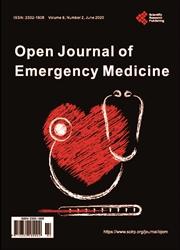Unexpectedly Good Neurological Outcome after Prolonged Cardiac Arrest
引用次数: 0
Abstract
Backgoround: Generally, neurological outcome of patients who have achieved return of spontaneous circulations (ROSC) with abnormal blood tests date and some severe organ complications is extremely poor. Because we experienced a case of good neurological outcome using two different types of extracorporeal membrane oxygenation (ECMO) in spite of prolonged cardiac arrest, we reported this case and reviewed the literature. Case presentation: A 36-year-old male suddenly collapsed at bar after drinking. Initial ECG showed ventricular fibrillation (VF) and subsequently underwent advanced cardiovascular life support. On admission, the ECG still showed VF, but pupillary light reflex was faintly present. Then, veno-arterial extracorporeal membrane oxygenation (VA-ECMO) support was established 54 minutes after collapse. Blood tests showed lactate was 15.8 mmol/l and NH3 of 251 μg/dl. To improve respiratory function after cardiogenic shock, we changed to veno-venous ECMO (VV-ECMO) and removed superabundant fluid using continuous hemodiafiltration. Patient was discharged on day-26 after a full functional recovery. Conclusion: In severe respiratory disorder, it would be more effective to change to VV-ECMO after recovering from cardiogenic shock while removing superabundant fluid using continuous hemodiafiltration. In predicting the neurological outcome of a post cardiac arrest patient, the presence of a pupillary light reflex may be more significant than NH3 and lactate.长时间心脏骤停后出人意料的良好神经预后
背景:一般来说,在血液检查日期异常和一些严重器官并发症的情况下,实现自主循环恢复(ROSC)的患者的神经系统结果极差。由于我们经历了一个使用两种不同类型的体外膜肺氧合(ECMO)的病例,尽管心脏骤停时间延长,但神经系统结果良好,因此我们报告了该病例并回顾了文献。病例介绍:一名36岁男性酒后突然倒在酒吧里。最初的心电图显示心室颤动(VF),随后接受了晚期心血管生命支持。入院时,心电图仍显示VF,但瞳孔光反射微弱。然后,在塌陷54分钟后建立静脉-动脉体外膜肺氧合(VA-ECMO)支持。血液测试显示乳酸为15.8mmol/l,NH3为251μg/dl。为了改善心源性休克后的呼吸功能,我们改用静脉-静脉ECMO(VV-ECMO),并使用连续血液透析过滤去除多余的液体。患者在功能完全恢复后于第26天出院。结论:在严重呼吸系统疾病中,在心源性休克恢复后改用VV-ECMO,同时用连续血液透析滤过清除多余的液体更有效。在预测心脏骤停后患者的神经系统结果时,瞳孔光反射的存在可能比NH3和乳酸更重要。
本文章由计算机程序翻译,如有差异,请以英文原文为准。
求助全文
约1分钟内获得全文
求助全文

 求助内容:
求助内容: 应助结果提醒方式:
应助结果提醒方式:


